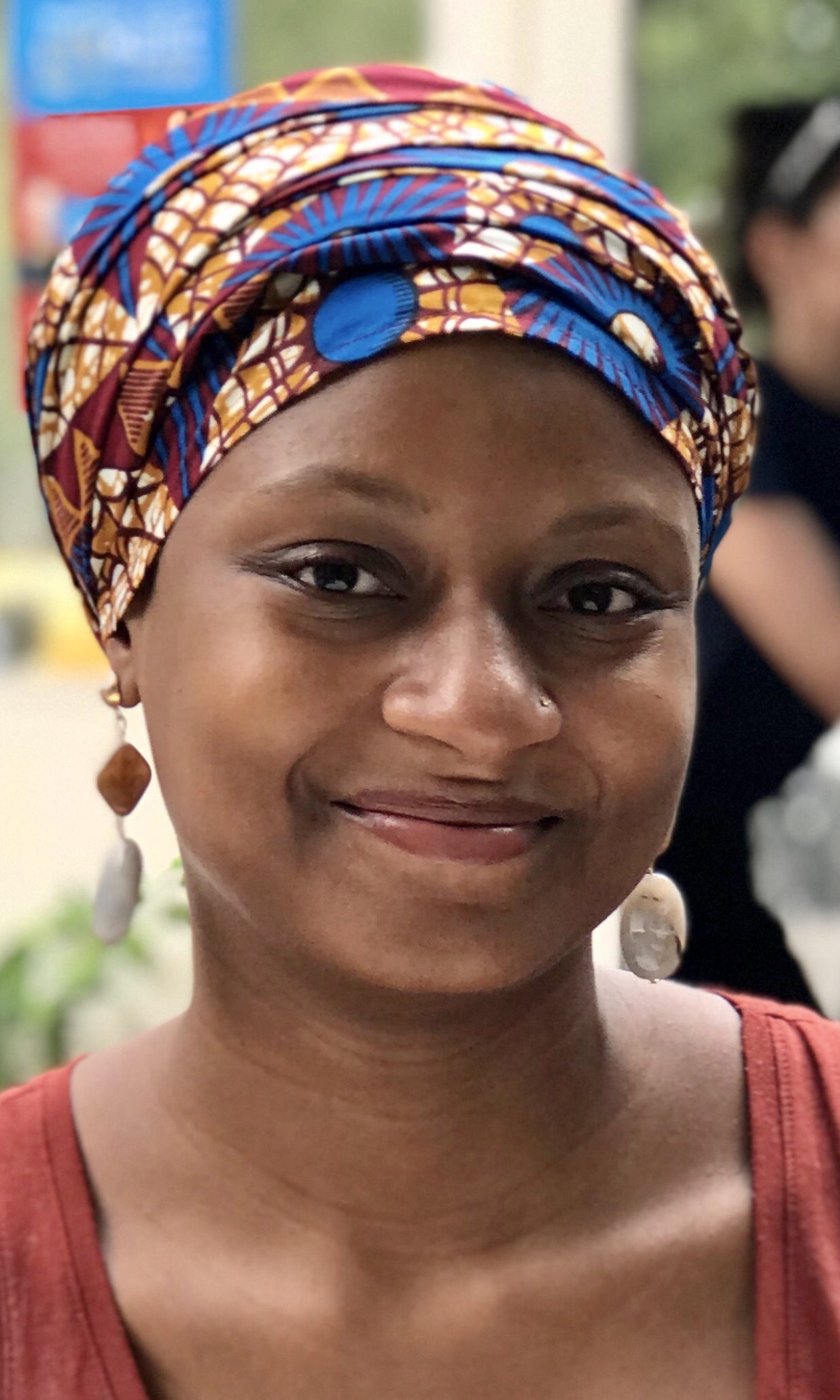Jazmin Graves, 2018-2019 AIIS Junior Research Fellow, has been featured on our site before celebrating her MIPAD Global Top 100 Most Influential People of African Descent Under 40 award. Today, Jazmin shares with us her AIIS funded research at the intersection of Sufi devotional traditions and African diasporas of western India.
Tell us about your dissertation research.
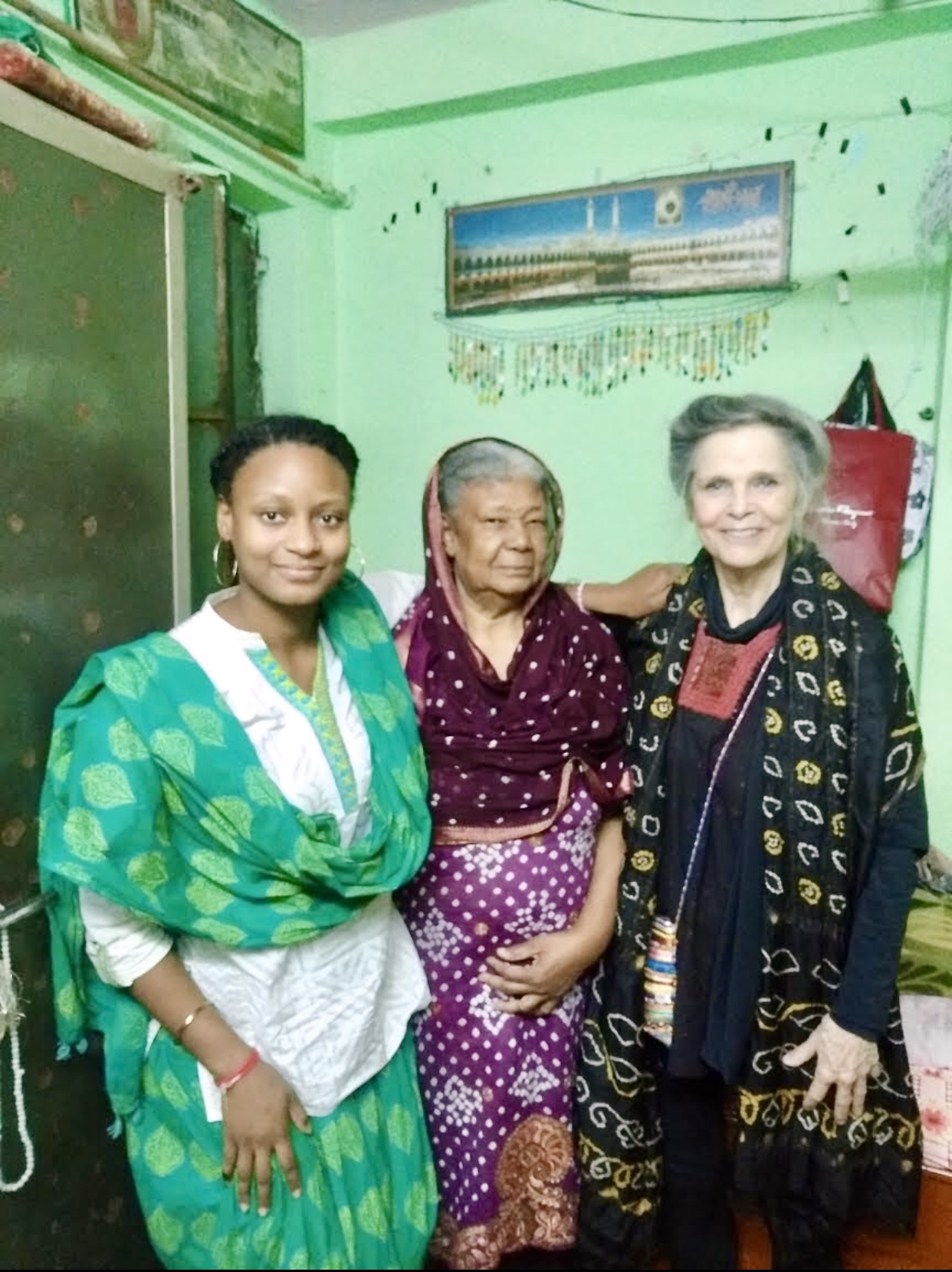
From Left to Right: Jazmin Graves; Rumanaben Sidi, respected elder and ritual specialist in Ahmedabad; Amy Catlin Jairazbhoy (UCLA), ethnomusicologist and dissertation adviser. Photo courtesy of Jazmin Graves.
My dissertation research focuses on the Sufi devotional tradition of Sidis (African-Indians) residing in the state of Gujarat and in Mumbai, the capital of the neighboring state Maharashtra. My primary research site is Ahmedabad, the largest city in Gujarat, which achieved international acclaim in 2017 as India’s first UNESCO World Heritage City. This city boasts several historical monuments whose unique architecture comprises a large part of its claim to fame; little known, however, is that a number of these monuments were constructed by, or as mausolea for, formerly enslaved east Africans who rose to political power in the sixteenth century. Today, the Sidis of Ahmedabad revere these historical figures as ancestors, whom they venerate alongside African Sufi patron saints. My dissertation analyzes the devotional music and rituals of the Sidi Sufi tradition as a lens through which to study the history of the African diaspora in western India.
Did you participate in an AIIS language program prior to your fellowship? If so, did it help support your work?
Yes, I participated in the 2016 Summer Urdu Language Program in Lucknow and the 2017 Summer Gujarati Language Program in Ahmedabad. I had studied Hindi formally throughout my undergraduate and graduate career, yet living and studying Urdu in India during the summer 2016 program significantly boosted my oral proficiency and listening comprehension skills while sharpening my attunement to regional variations in spoken Hindi-Urdu. Over a brief program break, I visited a shrine of the Sidi ancestor-saints in Mumbai, where I was able to apply my improved language skills to interview a Sidi ritual practitioner. This was the first bit of field research I had conducted, which completely redirected the course of my dissertation project.
The Gujarati language program in Ahmedabad provided a solid foundation in reading, writing, speaking and comprehending spoken Gujarati. I would later apply these skills during my field research in areas like Bhavnagar and Jambur in 2018, where Sidis generally speak Gujarati instead of Hindi-Urdu. However, the summer language program in Ahmedabad most supported my research by providing an opportunity for me to become familiar with the city of Ahmedabad, its monuments associated with African elites of the premodern period, and its current Sidi residents. It was due to my experiences during the summer language program that I chose Ahmedabad as my primary research site for the dissertation.
How did your experience on the AIIS fellowship help change the direction of your research?
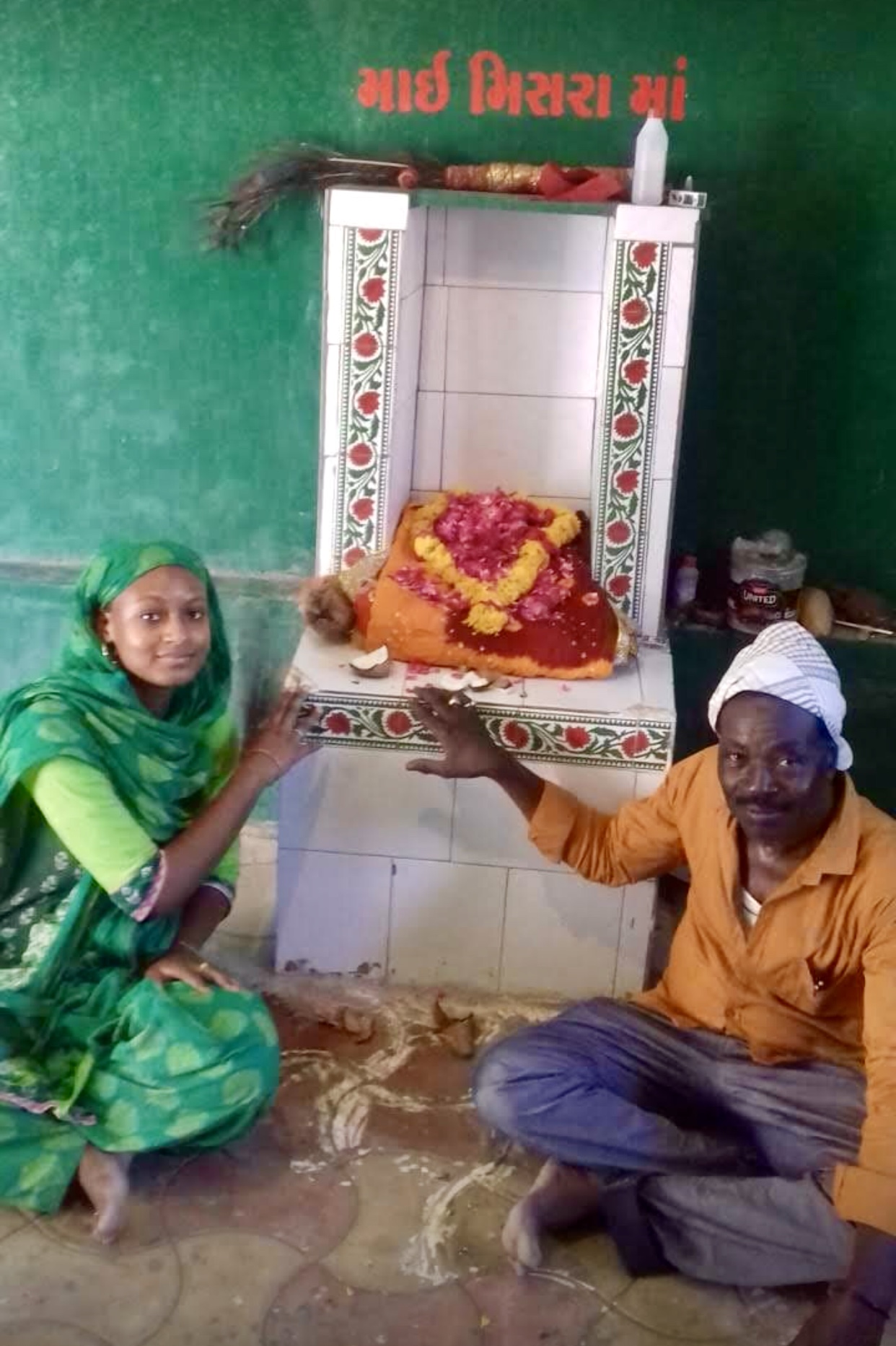
Jazmin at field site in Jamnagar with local Sidi community leader Rafikbhai Vajugada. Photo courtesy of Jazmin Graves.
I began the AIIS Junior Research Fellowship with the expectation that I would focus primarily on a distinct type of ritual and a particular corpus of devotional songs during my field research. However, the length of time that the fellowship supported my stay in India and the financial assistance that it provided allowed me to greatly expand the scope of my field research. I was able to visit a number of field sites within the expansive network of Sidi saint shrines throughout Gujarat and Mumbai. This generated a bird’s-eye view of the network and its diverse ritual practices, a point which deserves greater attention in academic literature concerning the Sidi Sufi tradition. This broadened perspective differed vastly from the underlying assumptions which limited my former approach to field research and ultimately would have constricted my understanding of my subject.
Did your dissertation change in the middle of fieldwork?
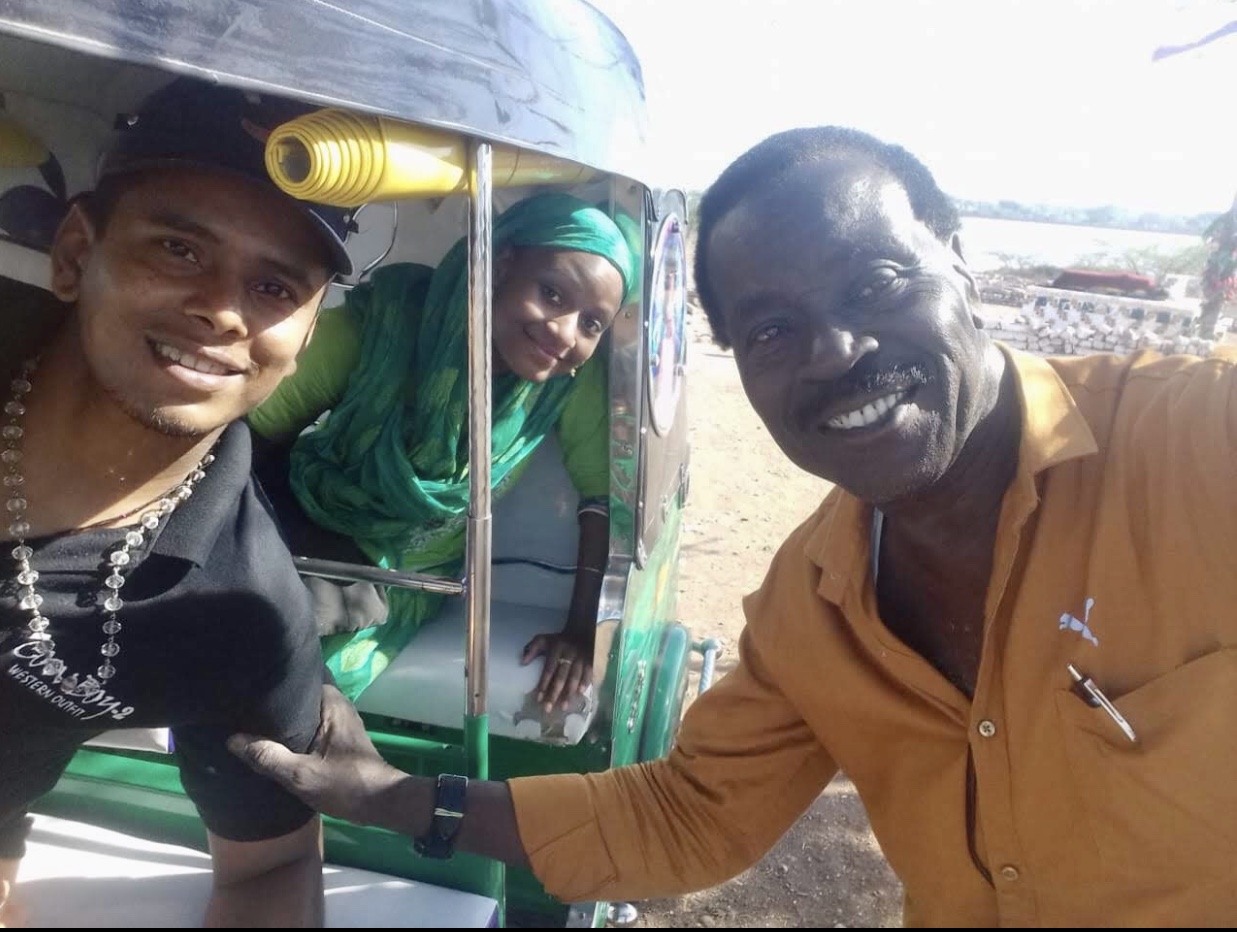
Jazmin and Rafikbhai returning from field site with rickshaw driver Wasimbhai Makua. Photo courtesy of Jazmin Graves.
My dissertation did not necessarily change during fieldwork under the fellowship, but my research methodology and my understanding of my topic did. In building and maintaining rapport with my research community, it became critical that I participate in social functions which on the surface appeared to be unrelated to my research goals. As anthropologist Michael Angrosino explains, “Sometimes, the membership role preferred by a researcher turns out not to be one that is agreeable to members of the study community; when this occurs, the relationship is often modified in order to satisfy members’ concepts of what is acceptable” (Naturalistic Observation, 21).
As an African American, I was warmly received as a fellow Afro-descendant from abroad; no longer solely a researcher, I was now an informal member of the Sidi community in Ahmedabad, and was expected to participate more fully in social events. I became concerned that spending time at social functions would detract from the amount of time available for research. Yet I adapted to my environment, which was quite different from the one-track experience of classroom-library-home which had become so familiar to me as a graduate student. This was perhaps the best approach that I could have taken, as informal interaction with my research community built invaluable personal relationships which I treasure to this day, and systems of support while alone and abroad. The time I spent at weddings and other social settings within my research community also unlocked a world of important insights and information which vastly enriched my dissertation research, and to which I otherwise would not have been exposed.
Part of your work seemed to include collecting songs and other media as well as different forms of research data (interviews and archival work). Can you tell us how the multimedia approach influences your work?
Though ethnographic methods have been central to my field research, my undergraduate and graduate training as a South Asianist has been heavily based in philological analysis. My dissertation project therefore incorporates oral texts such as historical narratives recorded during interviews, and devotional songs collected either through archival research at the AIIS Archives and Research Center for Ethnomusicology (ARCE) or interviews in the field. I analyze these sources in order to contextualize the ethnographic data I have collected through participant observation at private and public ritual events.
Anything else you’d like to share about your fellowship experience that may be helpful for those considering applying?
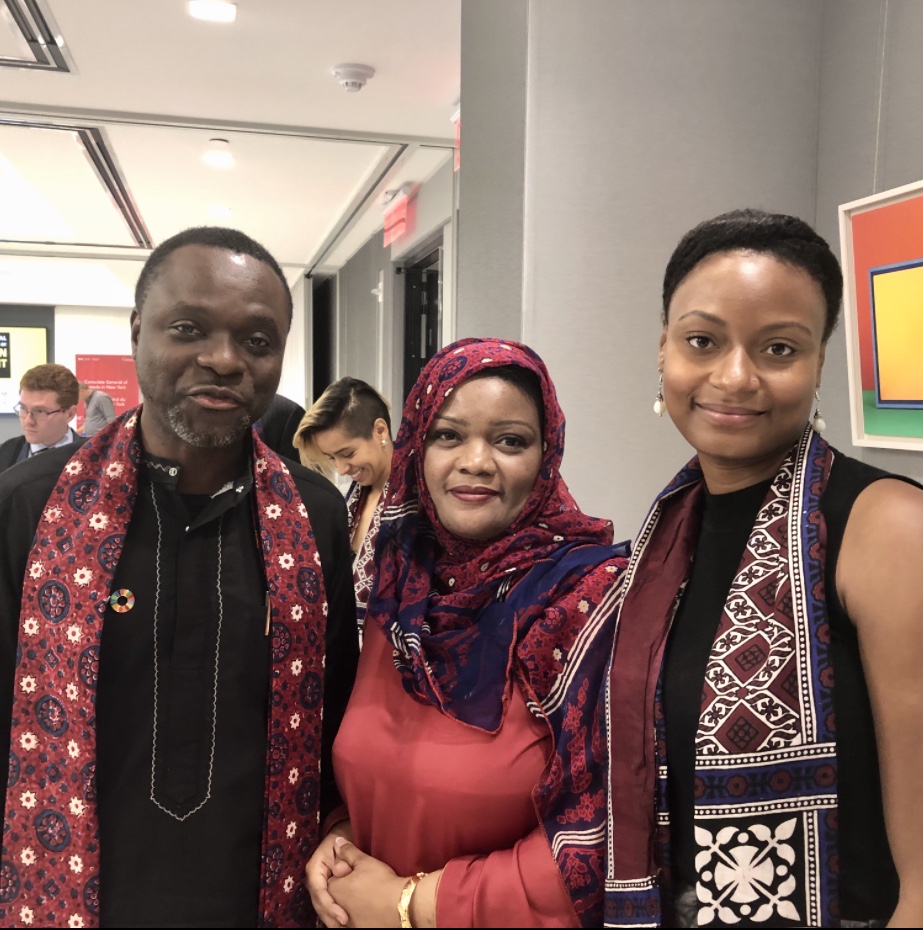
From Left to Right: Kamil Olufowobi, CEO of MIPAD; Tanzeela Qambrani, Pakistan’s first Sheedi (Afro-Pakistani) politician and MIPAD Class of 2019 honoree; Jazmin Graves. Photo courtesy of Jazmin Graves.
The AIIS language programs and Junior Research Fellowship have contributed immensely to my graduate career in general and to my dissertation research in particular. In supporting my field research, AIIS has unlocked opportunities for professional development that may not have been available otherwise.
For example, my experience as an African American researching an Afro-descendant community in India led to my invitation to participate in private rituals open to Sidi women only. This exposure to aspects of the Sidi Sufi tradition as yet unrecorded in the academic literature created an altogether unique field research experience.
This in turn opened the door to other opportunities for which I am exceedingly grateful, such as my induction into the Most Influential People of African Descent (MIPAD) Class of 2018 and the chance to meet Tanzeela Qambrani, Pakistan’s first Sheedi politician, at the MIPAD Awards Ceremony in 2019. The path ahead is strewn with possibilities for professionally supporting the progress of Afro-descendant communities in South Asia in honor of the United Nations International Decade for People of African Descent (2015-2024).
I encourage those who are considering applying to take advantage of this opportunity to grow academically, professionally and even personally as I have, with the generous support of AIIS’ programs.
